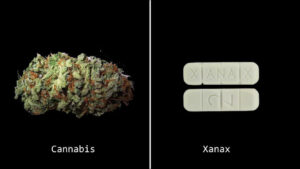

The evidence is building up more and more all the time: medical cannabis could serve as superior substitute for many other substances, including prescription drugs.
One 2015 cross-sectional study from Canada found that about 80.3% of 410 people substitute cannabis for one prescription drug. That includes drugs that could be harmful or addictive. That survey also found that people were substituting cannabis for recreational drugs. Fifty-two percent substituted cannabis for alcohol, and 33% substituted it with other illicit substances.
Those are serious health benefits, considering that marijuana is demonstrably less potentially harmful than most other illicit drugs and many pharmaceuticals. Perhaps most notable is the potential for cannabis to be a substitute for opiates, and therefore an important option for mitigation of the opiate addiction crises.
That evidence is seen in states in the US which have legalized medical marijuana. Researchers at RAND corporation conducted a working paper in 2015 found that, across 17 states that legalized medical marijuana, deaths due to opioid overdose dropped by 16-31%. Another study conducted in 2014 found that opioid-caused fatalities were 25% lower in states with medicinal cannabis.
Here are five potentially addictive pharmaceuticals that experts say, in some cases, can be replaced with marijuana:
This may be one of the clearest possible substitutions out there. Many people who suffer from chronic pain would rather use medicinal cannabis, and it can be a much healthier option.
For some people, a strain of sativa (stimulant) marijuana may be more effective than traditional stimulants like adder all.
This one may only work for some patients. Not everyone can have their anxiety treated with mariuana, but for some people a strain of indica may be helpful. Patients should be wary, however, that sativa strains may cause anxiety.
Cannabis may serve as a perfect sleep aid for some patients. Studies suggest it is a safer option than some prescriptions drugs like Ambien for insomnia sufferers.
Several studies have suggested that cannabis may be useful in treating depression. While it doesn’t work for everyone, cannabis can certainly be a safer option for those it does work for.
We ship and deliver world wide via USPS and various couriers.
We offer a wide range of secure and anonymous online payment options.
We care about you, our customer. Please contact us with any questions or concerns.
Find out more about the benefits of being a loyal and regular customer.
WE ARE EVERY GROWERS ONE STOP SHOP TO ACQUIRE PREMIUM CANNABIS SEEDS FOR SALE IN THE USA, CANADA AND AUSTRALIA

Farmers Lab Seeds 2024, | All Right Reserved
Seeds are sold as novelty items, souvenirs, and collectibles. They contain 0% THC. We encourage our customers to check the legislation in their Country, State, Province, and Municipality prior to purchasing items from our store. We do not provide growing information.
All seeds are sold as hemp, and lab tested under 0.3% THC. This product is not for use by or sale to persons under the age of 21. This product should be used only as directed on the label. It should not be used if you are pregnant or nursing. Consult with a physician before use if you have a serious medical condition or use prescription medications. A Doctor’s advice should be sought before using this and any supplemental dietary product. All trademarks and copyrights are property of their respective owners and are not affiliated with nor do they endorse this product.
These statements have not been evaluated by the FDA. This product is not intended to diagnose, treat, cure or prevent any disease. Individual weight loss results will vary. By using this site, you agree to follow the Privacy Policy and all Terms & Conditions printed on this site. Void Where Prohibited by Law.